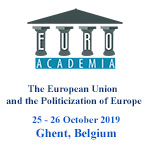Euroacademia Conferences
 Europe Inside-Out: Europe and Europeanness Exposed to Plural Observers (9th Edition) April 24 - 25, 2020
Europe Inside-Out: Europe and Europeanness Exposed to Plural Observers (9th Edition) April 24 - 25, 2020 Identities and Identifications: Politicized Uses of Collective Identities (9th Edition) June 12 - 13, 2020
Identities and Identifications: Politicized Uses of Collective Identities (9th Edition) June 12 - 13, 2020 8th Forum of Critical Studies: Asking Big Questions Again January 24 - 25, 2020
8th Forum of Critical Studies: Asking Big Questions Again January 24 - 25, 2020 Re-Inventing Eastern Europe (7th Edition) December 13 - 14, 2019
Re-Inventing Eastern Europe (7th Edition) December 13 - 14, 2019 The European Union and the Politicization of Europe (8th Edition) October 25 - 26, 2019
The European Union and the Politicization of Europe (8th Edition) October 25 - 26, 2019 Identities and Identifications: Politicized Uses of Collective Identities (8th Edition) June 28 - 29, 2019
Identities and Identifications: Politicized Uses of Collective Identities (8th Edition) June 28 - 29, 2019 The European Union and the Politicization of Europe (7th Edition) January 25 - 26, 2019
The European Union and the Politicization of Europe (7th Edition) January 25 - 26, 2019 7th Forum of Critical Studies: Asking Big Questions Again November 23 - 24, 2018
7th Forum of Critical Studies: Asking Big Questions Again November 23 - 24, 2018 Europe Inside-Out: Europe and Europeanness Exposed to Plural Observers (8th Edition) September 28 - 30, 2018
Europe Inside-Out: Europe and Europeanness Exposed to Plural Observers (8th Edition) September 28 - 30, 2018 Identities and Identifications: Politicized Uses of Collective Identities (7th Edition) June 14 - 15, 2018
Identities and Identifications: Politicized Uses of Collective Identities (7th Edition) June 14 - 15, 2018
Why the EU Integration Project is as Much about Emotion as it is about Rationality: An Analysis of EU Member States’ Communication Strategies Before National Referenda
-
-

-
Presentation speakers
- Erisa Zykaj, SMIT, Vrije Universiteit Brussel, Belgium
Abstract:
Brexit and the re-emergence of nationalism in the EU are evidence that the EU integration process is under strain. Moreover, the 2005 referenda in France and in the Netherlands, the 2008 referendum in Ireland and the 2015 referendum in Greece demonstrated that substantial numbers of citizens have serious doubts about where the EU is heading. Some scholars consider referenda as a secondary device within Western representative democracies. Others are critical of the referendum instrument, saying that it generates political chaos. What do the national referenda on EU issues that were lost tell us about the politicisation of the EU in the last fourteen years? This paper focuses on the communication strategies of EU Member States ahead of the ‘No’ votes in national referenda on EU issues between 2005 and 2016. Its main research question is whether the Member States adopted communication strategies based on both factual and emotional arguments to defend the EU integration process. To answer this question, we adopted a methodology based on the triangulation of data: Literature, Eurobarometer data and 20 interviews (carried out between June 2018 and September 2019) with EU Member State experts and journalists involved in at least one of the referenda. We analysed the communication strategies of both the ‘YES’ and ‘NO’ campaigns in four EU Member States: France, the Netherlands, Ireland and the UK. Our main finding is that Member States’ ‘YES’ camps failed to combine their arguments based on rationality with an emotional communication strategy. There was no appeal to a sense of belonging to a political, social and cultural project. Meanwhile, the ‘NO’ camps largely – and successfully – used communication strategies that appealed to emotions.
-
Related Presentations

Negotiating the Third Greek Bailout: A Signalling Game with Double-Sided Incomplete Information
- Simon Ganem













